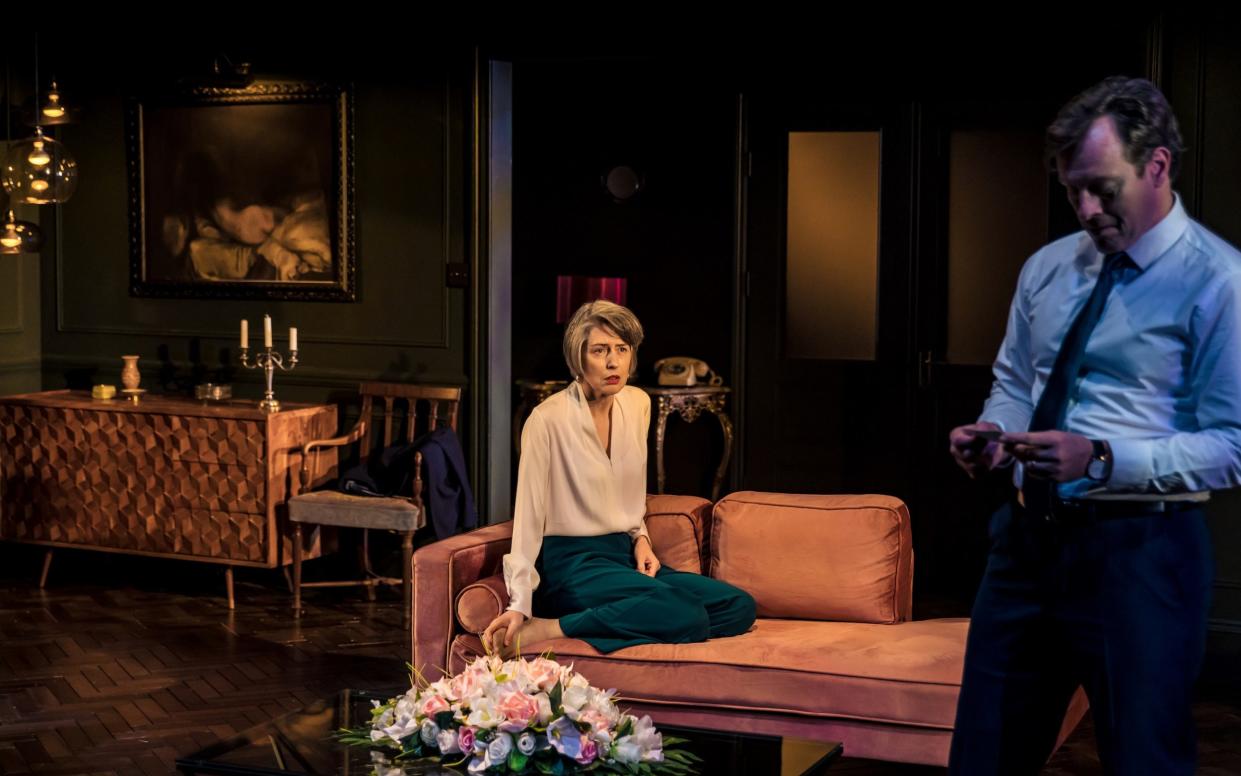The Forest, review: no wonder Gina McKee looks disappointed throughout

Hampstead must have thought it had struck gold in bagging a world premiere from Florian Zeller. Is there a contemporary playwright more Midas-fingered?
The French prodigy, 42, is a repeat-success on both sides of the Channel, and in dozens of other countries. His plays arrive with a production-line regularity, stamped with a distinctive gallic spirit of intellectual adventurousness. He has already had four West End runs since his UK debut with The Father in 2014.
With two Oscars awarded to the film version of the latter, starring Anthony Hopkins as an old man into whose dementia-addled mind we’re drawn, his work now attracts the finest actors. For The Forest, director Jonathan Kent has recruited some of the best in the business: a cast headed by Paul McGann, Gina McKee and Toby Stephens.
But all that talent is wasted in an evening that possesses a surfeit of Zellerian tricksiness – with an initially simple naturalistic scenario becoming more confusing as the action calculatedly unfolds - but doesn’t use its slippery form to communicate anything especially trenchant about his customary dramatic subject: ordinary relationships and the human condition.
Preview interviews with the author and Stephens have flagged up what it might take the unwitting audience-member a frustrating while to figure out: that the two male lead roles are effectively one and the same man.
Stephens initially gives us a model of self-possession, Pierre – apparently a surgeon - standing tall in a parquet-floored living-room and offering cool reassurance to his daughter, upset after discovering her boyfriend’s infidelity.
His wife Laurence (McKee) is more concerned but mainly, if subtly, scrutinises his off-hand reaction. Cut to a garish bedsit and a similar married man (McGann) talking to his girlfriend (Angel Coulby) as he post-coitally dresses; he’s not bothered by her working abroad, and she wants more commitment.
When we later see Stephens in the boudoir, conversing with the same woman, we might briefly infer a web of sexual intrigue involving rival partners. Such assumptions are assisted by Pinteresque moments in an eerie office when, amid a conversation with a suited figure in ghoulish white-face, it appears as if the last person Stephens’ character wants to see is McGann’s – a nightmare moment of recoiling dread.
Yet the source of the dread seems to be solitary guilt; viewed as a growing inconvenience, the mistress is seen bloodily slain. Is that by her hand, a hired hand, or that of her lover?
Enigmas and uncertainties are sustained. Yet the dialogue spells out, in a fairly lumpen fashion, what’s afoot – the translation skills of Christopher Hampton, Zeller’s habitual Angliciser, failing to bring a subtext to stilted-sounding exchanges, some of which are reprised in disconcerting variations. “My life has become an endless nightmare. Scenes play over and over again in my head,” explains Stephens’s emblem of unravelling masculinity.
With The Father, the discombobulating dramatic form perfectly answered the distressing subject-matter, and elsewhere Zeller has shown flair in theatricalising mental states that lie beyond the easy articulation of those caught up in them. Here the complications seem counterproductive, the donning of masks and the odd macabre vignette look trite, the plot mechanics dwindle into so much smoke and mirrors.
Despite being saddled with plywoody characterisation, Stephens’s imposing aura almost makes you think this is something weighty, but McGann struggles to animate what resembles a walk-on part. I mainly felt how McKee generally looked: blank, disappointed and wishing to be elsewhere.
Until March 12. Tickets: 020 7722 9301; hampsteadtheatre.com


